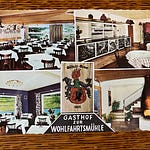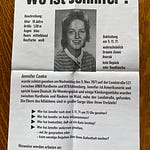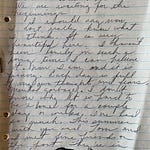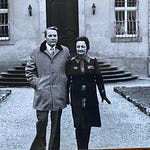first listen ↑
then read ↓
/*Nobody’s Property, a speculative memoir, is the first offering on Stop Casting Porosity. It combines audio in the form of a legacy true-crime podcast with brief text and images responding to the podcast. The audio makes sense without the text and images but the text is not meant to stand on its own. Please listen if you have the time! Just hit ▷ above.*/

This had become her life: in the morning feeding the chickens scraps from dinner the night before, walking down the path toward the water, putting on her smock and scarf and sweeping the patios before cleaning the inside of the villa, if the guests were out or departed. In the early days, Iris was snug across her belly in a sling, gently rocking with the work and able to eat when she needed to. Later, she went to the village school, protected for a while by her mother’s strangeness and her presumed father’s special status as a fallen hero. But children are children and villages are villages and eventually, some words of judgment came between Iris and her mother. Rose knew she would leave someday, and sure enough, she did, just as soon as she could.
Rose had grown used to her life alone, then. But all the repetitive, rhythmic motions gave her time and the cadence to think. Had there been a day that went by that she did not think of Bencomo, in those years he was away? The man who loved to walk, the happiest man on the island, in prison on the Peninsula. In those days, she wondered if he would ever come back; would he be ashamed to come back? Forbidden, somehow? These are things she should have known, but her own shame kept her from knowing.
And shame kept her from thinking of Michael for more than the minute it took her to realize she was thinking of him.
Funny how knowing about shame doesn’t help much.
This had been her life, but today was different: Iris was coming, Emily was coming.

That afternoon, Rose and Emily sat on the beach as Bencomo and Iris tried to teach the little one to skip stones. The tide was out, holding itself back for later.
Emily turned a smooth stone over and over in her hand and a few remnant grains of dark sand clung to her fingers. She stared out at the water and said: “My whole life I tried to stay safe for you.”
“Is that it? Trying to stay safe? or trying to be dead already?”
The two women looked at each other, really looked, then.
“So Edith’s gone,” Rose said, as much to break the tension as to find anything out.
“Oh yeah, has been for a while. Charles too, now. I’m sorry.”
Rose had thought it would be a declaration of independence, leaving everything behind in the forest and starting a new life, an authentic life–the real life, she thought of it then. They had never let her decide for herself, even going to Germany had been held up as the best thing, a lucky thing, “a brilliant opportunity” Edith said, but not a choice. She knew she could reject it if she tried hard enough, but then it would just be on to the next thing they picked out, in consultation with all their friends. If you had friends who were presidents of universities, of course you had choices! The best choice could be made for your daughter, and if she didn’t like it she was ungrateful.
Even now, she could get upset about it, she noticed. As soon as she noticed, the feeling faded. It really did not matter now. For once in her life, back in that freezing November wind, she had decided for herself. She thought. Of course, Michael was there, the mastermind, weaving sticks and twigs into a little tent above the backpack. Pinpointing a spot deep in the brush nearby that would be the perfect place to hide a body. He told her that part much later and it repelled her, thinking about how he could plan that, hiding the body of someone he didn’t yet know. It felt like a murder in the same way that her decision, now, has come to feel like a suicide.
Michael: whispering in the dark about Tenerife, the sun and the black sand and the drizzle that crept in and nourished the pines clinging to Teide’s skirts. The mulberries growing over secret water, the water from the base of the mountain whose movement was the special art of el llavero. “You will love it,” he said.
And only now does it occur to her that he sounded exactly like her mother.
Rose looked into her niece’s face and knew she was looking into a mirror—a cubist painting of regret, anguish, satisfaction, and the slightest bit of nostalgia—which is really self-pity, of course.
“You know, you could have been living for me, instead of dying,” she said.
And Emily answered: “I guess I didn’t need to.”

Later, the four of them sat around the table on the patio of the cottage. Emily wanted to see the place. Bencomo had carried the little girl most of the way up the steep path; she was exhausted from the beach and swimming all afternoon in the pool, and her foot was bandaged where a small shard of glass had lodged and made her bleed briefly and cry for a long time. Emily had tucked her into the bed in the cottage and Iris had told her a story about growing up there. Now, they all had iced drinks in front of them and Iris and Bencomo were smoking Iris’s cigarettes.
“Of course I gave them the explosive,” Bencomo was saying. “Your mother told me about Michael and about you and said she didn’t know who the father was. Before that, I cared if I lived or died or went to prison; after, no.”
Iris flicked her ash over the gray patio stone. “So because she wouldn’t choose, you were going to blow up the whole world.”
“But they were to put the bomb at the airport on Gran Canaria someplace strategic, away from people,” Bencomo defended himself. “In the end, they put it by the flower stall. It did go off. But it was not my fault those planes hit each other head on.”
Iris made a tsking sound, the unmistakable sound a child makes at the defensiveness of a parent. And so that, in its way, was a comfort.
Emily changed the subject: “But what happened to Michael?”
Rose gave her a look. “Michael left. His mother returned from time to time to take a peek at Iris. She let me keep working at the villa. I stayed in the cottage, waiting for Bencomo to come back.” She turned to Iris. “Can I bum one of those?”
Iris held the pack out to her and Bencomo grabbed the matchbook from the table. And they all sat on the back patio, the ice cubes tinkling, the cat chasing a moth, in the air the sulfur from a struck match.

Rose’s Journal
You had been in labor, painful, extended back labor, as they brought the survivors in. As the nurses coaxed you to walk and pant and get down on all fours and pray for the next wave to break, Michael attended the burn victims and the passengers with multiple fractures from leaping into the fog and smoke from the wing of the plane. You didn’t know how he found any moments to slip away, but he came back repeatedly to check on you, breathe with you.
Bencomo stayed with his brother for ten days, long enough for the authorities to have a chance to bicker each other into inaction after the crash. The bickering and inaction would continue, as would the radio broadcasts from North Africa demanding autonomy for the Canaries.
When Bencomo came back, you were there with Iris; and so was Michael; for a few days he’d come to the cottage for a quick meal of stew, bread, and wine and then gone back to the hospital to care for the injured. Then the Americans were all flown out on military planes, once the U.S. government had determined which branch of the military should have the honor. And suddenly, faced with a deep cliff of inactivity, Michael had fallen into a stupor. It was as if a lifetime’s emotion had been compressed into that one week, for him. Now he was used up and wrung out, a rag used to clean an entire house, a whole village.
So when Bencomo shows up at the cottage that evening, Michael is asleep in your bed. You speak softly, sitting at the small table outside on the stone patio, bundled against the fog: “I can’t turn him away.”
Bencomo is still just in his shirtsleeves, arms crossed. You’ve offered him wine but he won’t take it. “We gave ourselves away, this time.”
“But they haven’t arrested anyone.”
“It doesn’t matter, they will.”
He could stay with his brother; he could leave the island, go find work on the Peninsula–surely they needed people there who understood the flow of water? Your urging–you don’t know how prescient it is.
“You want me to leave?” He looks inside the doors to where Michael sleeps.
You look where he’s looking, hesitate. “I…no….”
Bencomo nods, twice, and stands. “I have been hiding with the goats for too long now.”
You stand up heavily and your chair scrapes the paving stones. Michael stirs and turns over. And just like that, Bencomo has gone. You can’t follow him with the baby.
The noise and movement have roused Iris, who starts to root around, hungry. You unbutton and position her under your breast, full of milk. As she opens her jaw wide to take the nipple her unfocused eyes, still newborn blue, search upward and find your eyes.
“I choose you,” you tell her. “I choose you.”
/*If you enjoy Nobody’s Property, please…
*We welcome thoughts from you, our beta readers.
*If it’s not for you, shoot an email to stopcastingporosity@substack.com with the word unsubscribe in the subject line. We get it! Time is precious. Guard your time with your life.*/
Thanks to Ronald Mackay and his delightful book, Fortunate Isle: a Memoir of Tenerife (2017: PlashMill Press, Friockheim, Scotland). From him I learned of the supreme happiness of El Llavero, The Key Man, as well as details of life on the north of Tenerife before the demise of Franco.












Chapter Fifteen: Autumn Rose